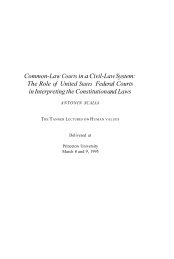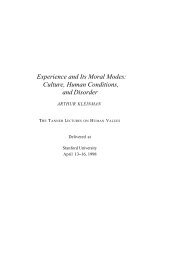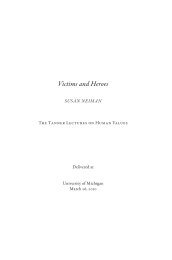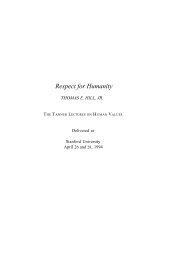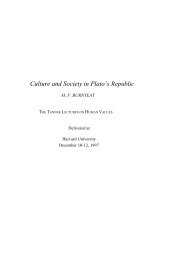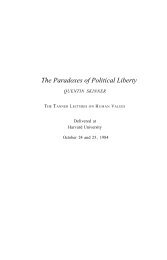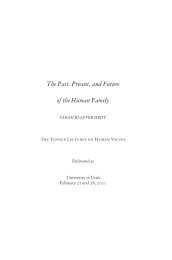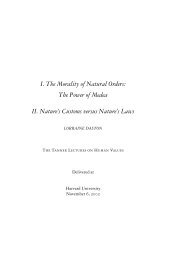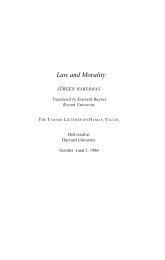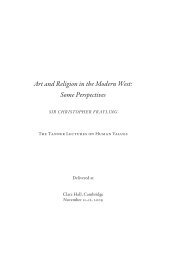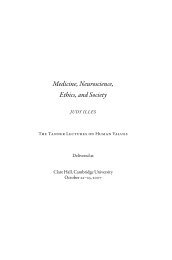Muguerza, Javier - The Tanner Lectures on Human Values
Muguerza, Javier - The Tanner Lectures on Human Values
Muguerza, Javier - The Tanner Lectures on Human Values
You also want an ePaper? Increase the reach of your titles
YUMPU automatically turns print PDFs into web optimized ePapers that Google loves.
108 <str<strong>on</strong>g>The</str<strong>on</strong>g> <str<strong>on</strong>g>Tanner</str<strong>on</strong>g> <str<strong>on</strong>g>Lectures</str<strong>on</strong>g> <strong>on</strong> <strong>Human</strong> <strong>Values</strong>that the basic instituti<strong>on</strong>s of society and the fundamental politicaldecisi<strong>on</strong>s would be willingly approved by all those affected bythem if the latter were able to participate - freely and equally -in the processes of the communicative formati<strong>on</strong> of the will,[but] democratizati<strong>on</strong> cannot mean an a priori preference for aspecific type of organizati<strong>on</strong>.” 69But whether we are dealing witha participatory or a representative democracy, or with a combinati<strong>on</strong>of the two, the collective decisi<strong>on</strong>s that are made there willhave to recognize in some way or other the prevalence of someversi<strong>on</strong> of the “rule of the majority,” something that, with goodreas<strong>on</strong>, Professor Elías Díaz never tires of reminding us of in ourcountry. 70Still, as Díaz is the first to recognize, the rule of the majorityis far from guaranteeing the justice of the decisi<strong>on</strong>s it enables. Intruth, nothing excludes the possibility that the decisi<strong>on</strong> of a givenmajority may be unjust, and the fact that decisi<strong>on</strong>s that are notmajority <strong>on</strong>es may also be unjust - and, very likely, or certainly,even more unjust - does not provide us with any ethical solace,especially if what we hope to do is use Habermas’s imperative(or the Habermasian versi<strong>on</strong> of the Kantian principle of universalizati<strong>on</strong>)to ground human rights. When it comes to puttingit into practice, the sophisticated c<strong>on</strong>sensualism of Habermas, orof Apel, unfortunately does not seem much more useful than c<strong>on</strong>venti<strong>on</strong>alism,or, if <strong>on</strong>e prefers, Bobbio’s c<strong>on</strong>sensualism.Take, for example, those human rights having to do with therequirements of liberty and equality of which I spoke at the beginningof this lecture. Habermas seemed to take them for grantedwhen he affirmed that in argumentative praxis we would have toc<strong>on</strong>sider the possibility, even the necessity, that all those potentiallyinterested participate (precisely as free and equal and in noother way) in the cooperative search for c<strong>on</strong>sensus. In which case,69 Habermas, Zur Rek<strong>on</strong>strukti<strong>on</strong>, 252.70E. Diaz, Da la maldad estatal y la soberanía popular (Madrid, 1984), 57ff.



